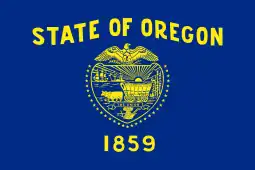Pacific Green Party
The Pacific Green Party of Oregon (PGP) is a political party in the U.S. state of Oregon, recognized by the Oregon Secretary of State.[3] It is affiliated with the Green Party of the United States. The party has occasionally elected candidates to public office at the local level.
Pacific Green Party of Oregon | |
|---|---|
 | |
| Governing Body | Coordinating Committee 7 Co-Chairs |
| State Senate Leader | None |
| State House Leader | None |
| Founded | 1997 |
| Headquarters | PO Box 1606 Eugene, OR 97440 |
| Membership (April 2020) | 7,679[1] |
| Ideology | |
| Political position | Left-wing |
| National affiliation | Green Party of the United States |
| International affiliation | Global Greens |
| Colors | Green |
| Oregon State Senate | 0 / 30 |
| Oregon House of Representatives | 0 / 60 |
| Local Offices | 9 (March 2021)[2] |
| Website | |
| pacificgreens.org | |
The party gained public attention during Ralph Nader's presidential campaign in 2000, which saw Nader garner over 5% of the vote statewide.
History
The party was initially founded as the Pacific Party in 1992, largely in response of the perceived failure of the Democratic Party to provide meaningful opposition to the 1991 Gulf War.
Many of the party's early candidates were also highly involved in the forest protection movement. These included candidate for United States Senate Lou Gold in 1994; Joe Keating for Congress and Andy Davis for state representative in 1996; and Blair Bobier for governor and Karen Moskowitz for U.S. Senate in 1998. Davis and Keating were arrested for civil disobedience at the United States Forest Service office building in downtown Portland during the campaign, chaining themselves to a desk along with local activist attorney Stu Sugarman.
Ralph Nader was the party's nominee for President of the United States in 1996, and his vice-presidential candidate, Winona LaDuke, came to Portland and walked a local picket line in support of raising the minimum wage. In addition to running candidates for office that year, the Pacific Party helped pass initiatives to raise the state minimum wage and expand the Portland area light rail system.
In 2004, Teresa Keane, the Green Party's candidate for the United States Senate, won 2.4% of the vote – more than any other Green candidate for the U.S. Senate in that year. In 2006 Keane was elected Chair of the newly formed Green Senatorial Campaign Committee (GSCC),[4] a seven-member committee elected by the National Committee of the Green Party of the United States to raise funds for senate candidates.[5]
In 2020 the Lane County chapter of the PGP contended with the PGP Statewide Coordinating Committee, energized by the strength of Lane’s appeal to constituencies on the libertarian and right sides, as well as the left, evidenced by large numbers of signatures collected to support Lane affiliated candidates for Federal office, which horizontally challenged the SCC that was deemphasizing anti-imperialism while credulous on Russia-gate, even as party registration had declined by approximately 20% relative to 2016.
Platform
The party's platform emphasizes environmentalism, economic and social justice, peace and nonviolence, and respect for diversity. The party's platform expresses the following positions:[6]
- Public campaign financing for all campaigns for public office and strict limits on political campaign contributions
- Support for net neutrality
- Support for instant run-off voting, proportional representation in the Oregon State Legislature, and proportional allocation of Oregon's Electoral College (United States) votes by Congressional district with the end goal of electing the President solely by the popular vote with the abolishment of the Electoral College (United States)
- Voting rights for convicted felons and ex-felons
- Passage of a Single-payer health care system
- Protection of a women's right to abortion and supportive of legal physician-assisted suicide
- Establishment of carbon taxes to promote use of renewable energy
- Opposed to nuclear weapons and to using nuclear power to generate electricity
- Support for legalization and cultivation of hemp and marijuana
- Support for a ban on patent claims on naturally originating organisms and plants
- Support for the establishment of a federal Department of Peace
- Support for the release of nonviolent drug offenders from prison
- Opposed to private prisons
- Abolishment of the death penalty
- Abolishment of the state's lottery
Current elected officials
The following are currently elected Green officeholders in the state of Oregon.[7]
- Alex Polikoff, Corvallis Rural Fire Protection District - term through May 2021
- Cindy Johnsen, John Day Water District, Commissioner Position 5 (Clatsop County) - term through May 2021
Election results
Presidential elections
| Year | Nominee | Votes | % |
|---|---|---|---|
| 1996 | Ralph Nader | 49,415 | 3.59% |
| 2000 | Ralph Nader | 77,357 | 5.04% |
| 2004 | David Cobb | 5,315 | 0.29% |
| 2008 | Cynthia McKinney | 4,543 | 0.25% |
| 2012 | Jill Stein | 19,427 | 1.09% |
| 2016 | Jill Stein | 50,002 | 2.50% |
| 2020 | Howie Hawkins | 11,831 | 0.50% |
See also
References
- "Voter Registration by County april 2020". Retrieved May 19, 2020.
- "Officeholders". Green Party US. Retrieved 8 March 2021.
- "Voting In Oregon". Retrieved May 19, 2020.
- Archived September 27, 2007, at the Wayback Machine
- Archived September 28, 2007, at the Wayback Machine
- "The Platform of the Pacific Green Party". Pacific Green Party. Retrieved May 19, 2020.
- "Greens in Office". Retrieved May 19, 2020.
